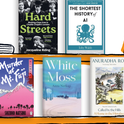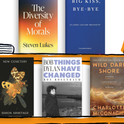In 2007 a home affairs select committee produced a report about young black boys in the criminal justice system, calling for the department for education and schools to consult with black community groups to make the curriculum more relevant—and to find “content which interests and empowers young black people.” We can safely assume they were not talking about Ovid, Chaucer or Shakespeare.
Sadly, the canon has a serious image problem amongst black people, too. Many see it as the preserve of white public schoolboys, taught in fusty classrooms by doddery Oxbridge tutors. We have been led to see it as whitey’s birthright, not ours. Meanwhile anti-racist educationalists and black community leaders rail against a racist curriculum which does not meet the cultural needs of their students, with some calling for “black schools” in which black culture—rather than an elite white culture—can be taught.
But the literary canon should not be the preserve of any one race. As both a writer of colour and an ardent (but not uncritical) devotee of the canon, I have little time for people who say that black people cannot relate to books written 2,000 years ago by a bunch of dead white guys, or that Maya Angelou is better than Shakespeare. This denies us our shared humanity across racial divides.
Dead white men, the pillars of the western canon, remain supremely relevant to black people in the 21st century, because their concerns are universal. At its best, the canon elucidates the eternal truths at the heart of the human condition. It addresses our common humanity, irrespective of our melanin quotient. Homer, Virgil, Dante, Chaucer, Shakespeare, Milton, Dickens—all male, all very white and all undeniably very dead. But would anyone be so foolish as to deny their enduring importance? Boethius’ Consolation of Philosophy, Boccacio’s Decameron or Pico’s Oration On The Dignity of Man are as germane to black people as they are to white. There is no apartheid in the philosophical musings of Cicero, no racial segregation in the cosmic grandeur of Dante and no ethnic oppression in the amorous sonnets of Shakespeare. These works can, if given the chance, speak as much to Leroy in Peckham or Shaniqua in the South Bronx as they can to Quentin in the home counties.
My work over the last five years as a volunteer mentor with young people in Peckham on a scheme called “Leaders of Tomorrow” has proven to me that black teenagers have both a desire and an ability to engage with the canon, if only given the chance. Along with regular discussions on current affairs and books, we learn Latin proverbs and read Shakespearean tragedies. These are works that they do not see in their school classrooms, and which their teachers believe will be too challenging for them. Yet despite this fatuous dismissal of dead white men, my mentees show an aptitude to expand their horizons beyond the limiting confines of SE15.
Parts of the black community, however, continue to rail against the whiteness of the canon and try to promote second or third tier black writers such as novelist E Lynn Harris or poet James Weldon Johnson. They are abetted by trendy educationalists in the establishment who feel acute post-colonial guilt and wish to show their anti-racist credentials by stressing the “diversity” of works taught in schools.
As black people, we cannot change history, and should not try to reject knowledge because of its provenance. It would be far better to focus our attention on understanding the atrocities that have been committed in the name of the canon, or why the humanities have, on the evidence of history, so comprehensively failed to humanise.
We should accept the truth of history, which is that white men have dominated intellectual life in the west. Let’s not resist this; let’s run with it. It is western history that has indelibly shaped our consciousness. We live in Britain, not Timbuktu. We might hail from Africa or the Caribbean, but our lives, for better or for worse, are lived in the modern western world, and shaped by the traditions that have moulded it. If we acquaint ourselves with the grammars of the west, it will indubitably help us to understand it and then duly succeed here.
Afrocentrists do have a valid point when they argue that championing a Eurocentric canon can help reinforce the prejudice that white is cerebral and black is physical. It is precisely the righteous black quest for intellectual parity that infuses discussions of the canon and its provenance with such tension, since there has historically been so much at stake. And while I do not subscribe to the “Beethoven-is-Black” school of thought, it is true that the canon is more diverse than many people realise. Terence, regarded as one of the founding fathers of western drama, and a seminal influence on Renaissance humanism, was in fact a freed black African slave from Carthage. Saint Augustine, philosopher, theologian and intellectual bedrock of Christianity, was North African, from modern day Algeria. In our consciousness, we have come to see these figures as white. So the way the canon has been refracted through racist lenses does need to be incisively and intelligently critiqued.
Of course, there are many black luminaries—James Baldwin, Aimé Césaire, Alex La Guma, Frantz Fanon, Langston Hughes, Ernest Gaines, Toni Morrison and Walter Mosley, to name a few—who deserve a place in the canon. What they possess in particular is what WEB Du Bois famously called “double consciousness”: the experience of both worlds, which white authors invariably lack. As a result, such authors excel in exploring questions of the “other” and its relationship to dominant constructions of race.
But here’s the rub—and the main reason why I come to praise dead white men, not to bury them: the overwhelming majority of black thought and literature of the last 400 years, by simple dint of the painful exigencies of human history, is devoted to chronicling man’s inhumanity to man. Naturally, if someone has me in shackles, is holding a gun to my head and denying me my basic human rights because of the colour of my skin, I would choose to firstly devote my intellectual energies to addressing that injustice. But it is undeniable that man’s inhumanity to man is only one part of the human condition.
The dead white men never had to face the evils of slavery or the physical and emotional oppression of racism. Thus their minds were freer to range over the great philosophical questions, metaphysical quandaries and cosmological dilemmas. In short, they have been allowed to address man in relation to the macrocosm, as opposed to just the microcosm.
Black writing of the last 400 years can and does touch on these universal, cosmic issues, but it is unfortunately much rarer for it to do so, because of the intellectual straitjacket created by historical oppression. This is why as black people we need the western canon in our lives. Our perspective is impoverished if we only seek knowledge from the writings of those sharing the same colour skin as ourselves. Black school students today are not shackled in the way their predecessors were, so they should not seek to limit themselves, and can only benefit from access to a wider range of intellectual riches.
Many great black intellectuals—men such as CLR James, WEB Du Bois and Stuart Hall—were all devotees of the canon. They understood that you have to be fully conversant in it to be able to meaningfully criticise it.
This is why our education system needs to stop treating the classics as irrelevant and reinforcing the ingrained prejudices of the younger generation. When teachers seek eagerly to give black students “relevant” literature, they inadvertently send patronising, and essentially racist, messages about expectations and aspirations—ultimately denying black students their own humanity.
However unpalatable it might be to our sense of racial pride, we as black people need to read the dead white men with alacrity. If nothing else, the canon will help us understand why, even to this day, the annals of human history are callously besmirched with the blood of so many dead black men. As the African-American scholar Dr. Molefi Kete Asante has said, “It is not enough to know. One must act to humanise the world.”
Other articles in Prospect's special feature on the failings of multiculturalism today:
Tony Sewell on education
Swaran Singh on psychiatry
Sonya Dyer on the arts
Munira Mirza on her hometown of Oldham
In praise of dead white men
Efforts to make education more "relevant" to black people can be both patronising and harmful. The western literary canon should be taught to everyone
September 23, 2010











